英语翻译 句子成分分析
英语句子结构分析成分
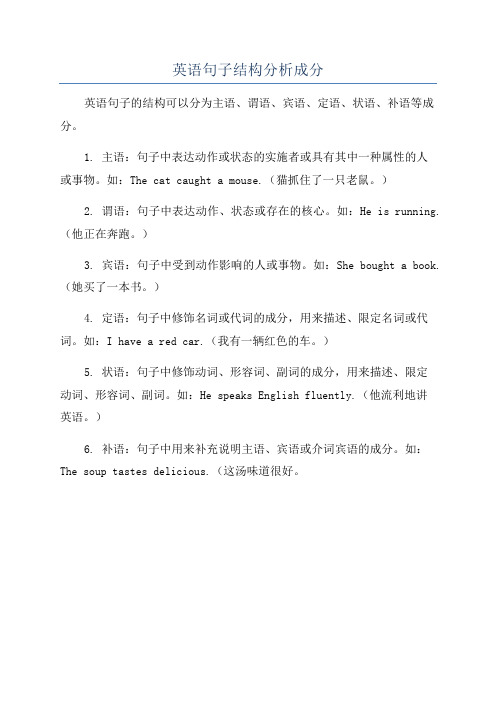
英语句子结构分析成分
英语句子的结构可以分为主语、谓语、宾语、定语、状语、补语等成分。
1. 主语:句子中表达动作或状态的实施者或具有其中一种属性的人
或事物。
如:The cat caught a mouse.(猫抓住了一只老鼠。
)
2. 谓语:句子中表达动作、状态或存在的核心。
如:He is running.(他正在奔跑。
)
3. 宾语:句子中受到动作影响的人或事物。
如:She bought a book.(她买了一本书。
)
4. 定语:句子中修饰名词或代词的成分,用来描述、限定名词或代词。
如:I have a red car.(我有一辆红色的车。
)
5. 状语:句子中修饰动词、形容词、副词的成分,用来描述、限定
动词、形容词、副词。
如:He speaks English fluently.(他流利地讲
英语。
)
6. 补语:句子中用来补充说明主语、宾语或介词宾语的成分。
如:The soup tastes delicious.(这汤味道很好。
英语句子分析的技巧

分析句子成分的技巧英语中有两种基本结构:主谓宾结构和主系表结构。
分析句子成分时,大家记住:先找主谓宾,再找定状补1. 一个正常的句子必须有主语和谓语。
主语是句子的“话题”,谓语是句子的“灵魂”。
谓语由动词构成,是英语时态、语态变化的主角,一般在主语之后。
2. 句子的成分从谓语动词处来划分比较容易。
谓语动词前面的部分是主语,后面常接宾语,修饰谓语动词的是状语,修饰主语、宾语的是定语,若谓语是系动词,则系动词后的部分是表语。
如:I am a teacher. 其中,I 是主语,am是谓语,a teacher 是表语。
He likes playing football very much. 其中,he是主语,likes是谓语,playing football 是宾语,very much是状语。
3. 状语的位置比较灵活,可放在句首,句中或句尾。
如:When I called on her, she was playing the piano. (句首)He likes playing football very much. (句尾)I have never been there before. (句中)4. 表语放在系动词之后。
如:I am a teacher. 其中,a teacher就是表语The soup tastes delicious.表语和宾语区别:1. 从定义上区分,动作的对象为宾语;表性质和特征的为表语。
2. 可根据动词判断,实意动词后的为宾语,系动词后的为表语。
定语和状语区别:定语用来修饰名词或代词;状语用来修饰动词,形容词或全句定语翻译为“…的”状语翻译为“…地”如The useful dictionary was given by my mother last year.To do today’s homework without the teacher’s help is very difficult.I don’t like the picture on the wall.The days get longer and longer when summer comes.My brother hasn’t done his homework.。
英语句子成分分析

划出句中的直接宾语和间接宾语
① Please tell us a story. ② My father bought a new bike for me last week. ③ Mr Li is going to teach us history next term. ④ Here is a pen.Give it to Tom. ⑤ Did he leave any message for me?
They are workers. _______ 作表语 Two and three is five._______ 作表语 The girl looks beautiful._______作表 My mother is at work.______作表语 Seeing is believing.______作表语
10
定 语attribute
---用于修饰名词或代词,一般由形容词、名词、数词、 不定式等充当。
They have a clever son.__________ 做定语 She is a chemistry teacher. __________ 做定语 There are two students in the classroom.__________ 做定语
同位语
13
趁热打铁
1. Lily is cleaning the desk now. 2. Her garden is the best in our town. 3. I like this book very much. 4. The girl on the blue bike is Jane’s sister. 5. She didn’t come to my party because she was ill.
句子成分分析非谓语动词

句子成分分析非谓语动词在每年的英语高考试题中非谓语动词都占有20分以上的分数,足见它的重要性。
在解决非谓语动词的考查中,往往很多学生不知所措。
个人认为对句子成分的掌握是很重的一个因素,下面我将从句子成分的角度来对非谓语动词进行分析,以利于大家掌握。
一.主语.(1). To clean the room is my job today. (不定式)(2). Cleaning the room is my everyday job.(动名词)(3). To teach these students will be very interesting. (不定式)(4). Teaching these students is very interesting. (动名词)从上面的(1)和(3) 我们可以发现不定式作主语表示具体或将来的动作,而动名词作主语(2)和(4)表示动作的反复发生或经常性的动作.不定式作主语的时候我们可以使用形式主语it的形式来进行表述,看下面的例子:(1).It is important for us young people to learn English well.(2).It is very kind of you to help me.以上两个例句可以总结为这样的句型:it +be +adj for/of sb to do sth,与介词for 搭配的形容词经常为:important, necessary, possible, impossible, useful 等,而与介词of 搭配的形容词经常是:good, clever, foolish, wise, rude, silly 等表示与人的品性有关的形容词.既然不定式可以用形式主语,那么动名词也可以使用这种方式,见下面的例子, (1). It is no use talking about it with him.(2). His coming late to school made the teacher very angry.第一种结构常见于以下句型:(1). It +be no good/use doing (2). It + be of no good /use /useless doing(3). There +be + no good /use /point/ trouble /difficulty doing上面的例句His coming late to school made the teacher very angry.是动名词的复合结构作主语,其中his 不可以改为him.(在动名词作宾语中有说明)二. 表语(1). My job is to clean the room today.(不定式)(2). My everyday job is cleaning the room. (动名词)(3). The new is very exciting .(现在分词)(4). I was excited at the news.(过去分词)从例(1) 我们可以知道不定式作表语表示动作的具体性,而例(2)表明动名词作表语表示动作的反复或经常性. 例(3)的现在分词作表语表示主语的特征,翻译为“令人....",例(4)过去分词作表语表示主语的状态,与人的心理活动有关,这类动词为:interest, surprise ,please, disappoint, discourage 等.另外我们有时候会遇到这种情况,系表结构中主语和表语都是非谓语动词,这样的话前后要保持一致,例如:(1).To see is to believe.(2). Seeing is believing . 前后的主语和表语不可以进行交叉使用.三.宾语(一).不定式1.只接不定式作宾语:afford, agree, decide , hope ,wish, plan, manage,promise ,want等(1).He wants to help me.(2) . He promised to help me do that job.2.vt +疑问词+不定式: discuss ,wonder ,know, tell, teach(1). They are discussing how to do it.(2). Please tell me what to do next.3.v +介词+疑问词+不定式:(1).Give me some advice on how to deal with the problem.(2).They are talking about when to go there.(二).动名词1.只接动名词作宾语:avoid ,finish, mind , enjoy, risk, practise, imagine, appreciate, delay, put off, give up, insist on, resist.(1). He always practices speaking English in the morning.(2). The lucky bird avoided being shot by the hunter.(3). I will appreciate hearing from you now and then.2. love, like, prefer 接不定式与动名词的差别(1).He loves seeing films.He likes staying at home reading ,but he loves to go the cinema to see “The Seven Swords”.(2). He prefers to stay at home rather than go to the cinema.He prefers staying at home to going to the cinema.3. allow, permit, forbid(1). We don’t allow smoking here.We don’t allow you to smoke here.(2). We forbid their entering the room.We forbade them to enter the room.4. (1)try, remember, forget, regret, stop, mean 接不定式与动名词的区别(2) want ,need ,require 接不定式与动名词的区别四. 定语(一). 不定式(1). I have a lot of work to do .(将来)(2). Do you have anything to be typed ,sir? No, thanks. I had had them finished yesterday.(3). He is a nice person to get along with.不定式作定语是经常表示将来的概念,例(1)和(2)是比较常见的考查,注意比较不定式的逻辑主语是不是句子的主语,如果是,那么用不定式的主动形式,否则使用不定式的被动形式.例(3)提醒大家注意不定式作定语时,有时侯一些不及物动词须和相应的介词搭配之后才能作修饰成分.另举几例:(4).He is the one to send the letter to .(5).They had no room to live in.(6).They haven’t got any tool to do the work with.(二). 动名词 : 动名词作定语表示被修饰词的用途,这一点一定要和现在分词作定语区别开来,看下面的例子:(1). A swimming pool = a pool that is used to swim in(2) a walking stick = a stick that is used to walk with (动名词)(3). A sleeping boy = a boy who is sleeping(现在分词) (4). A running car = a car that is running动名词作定语一般表示被修饰词的用途,而现在分词作定语在例(3)和(4)中表示被修饰词所处的某种状态或动作的进行.(三).现在分词1.表示动作正在进行,或无确切时间.(1). Who is the man standing there?(2).There a tree standing in front of my house.(3). He showed us around the factory being built there .2. 说明中心词所具有的动作功能,一般翻译成"使/令人......."The moving story moved everyone to tears.The frightening noise frightened everyone present.此处所使用的现在分词往往与人的心理状态动词有关,例如:surprise, disappoint, please, discourage, tire, move,frighten等.在过去分词作定语中我们将对它们进行比较.(四).过去分词1.过去分词和中心词之间是被动关系,表示时间上的完成概念.(1).The building built last year can hold 1000 people.(2). The question discussed at the meeting yesterday is of great importance.2. 过去分词表示动作的完成情况.(1).The ground is covered with fallen leaves.(2). America is a developed country.类似的词有:boiling/boiled, burning /burnt, falling/fallen, developing/developed等.3. 表示与人的心理活动有关.(1).The puzzled look on his face suggested that he didn’t understand the question.此句暗含:He was puzzled atthe question 之意.试比较下句:(1).The puzzling question madehim puzzled. (2). With the son disappointing, theparents felt very disappointed. 上面的两个例子告诉我们应该注意每个句子本身的意义然后再去决定使用哪种分词形式,不能一概而论.出现与事物有关的就是现在分词,与人有关的就是过去分词.五.状语(一).不定式1.目的状语:不定式作状语通常可以使用in order to 或so as to 进行替换,但是我们应该注意,in order to 可以放在句首或句中,而so as to 只能用在句子中间,看下面的例句:(1). To /In order to catch the first train, he got up early this morning . 此句可以改写为:He got up early in the morning to/ in order to/so as to catch thefirst train.此句也可以改写为:He got up early in the morning so that /in order that he could catch the first train.2.原因状语:放在表示情感或心理方面的形容词或过去分词之后来说明产生情绪的原因.例:(1).I’m very happy to see you here(2).He was disappointed to learn that he failed again.(3).We were frightened to hear the bad news.3. 结果状语:通常出现于以下固定搭配中,too….to, enough to….. , so….as to…..,such…..as to…..,only,例如:(1).My hand is too cold to write.(2). He was so angry as to be unable to speak.(3). He was such a fool as to believe this.(4). He arrived at the station, only to be told that the train had left.(二) .现在分词1.时间状语:(1).Hearing the bad news, he cried= As soon as he heard the bad news he cried.(2).Wandering through the street, I didn’t know where to go.此句可替换为:While/When wandering through the street, I didn’t know where to go .如果非谓语的动作发生在主句的动作之前,那么非谓语可以使用完成时态,如:(1).Having finished the work, he left the office.2.原因状语(1). Not knowing what to do, he was at a loss.(2). Having worked for a long time, we all felt very tired.3.伴随(方式)状语(1).Don’t sit there, doing nothing at all.(2).He came here running all the way.(3).Mother is in the kitchen cooking.4. 结果状语(1).They fired at the enemy, killing two.(2).His parents died, leaving him an orphan.5.其他状语(1).Having been told many times ,he still couldn’t remember the rule.(让步状语)(2).Standing on the top of the mountain, you can see the village more clearly.(条件状语)(三).过去分词1.时间或条件状语Heated ,water can be turned into gases.此句可以改写为:If/When water is heated ,it can be turned into gases.2. 方式(伴随)状语(1)The teacher came in, followed by his students.(2).The man sat there ,lost in thought.此句注意,过去分词作伴随状语时,一般省略系词.3. 原因状语(1).Praised by the teacher at the meeting, he felt very happy.(2).Hunted everywhere ,the wolf had nowhere to hide.4. 让步状语(1).Seriously wounded ,he still kept on fighting.(2).Told many times ,he just couldn’t remember it.此句也可以改写为:Though having been told many times ,he just couldn’t remember it.六.补语(一)不定式作补语:(1).Iasked him to go there.(2).We watched him cross the street.不定式作补语要注意以下几点:A. 使役动词:5看3让2听1感觉带get, 注意主动和被动的区别,见下面的例子:(1). We saw him cross the street.(2). He was seen to cross the street.(3).We got him to do the job.这些词中let 和have 是不用被动语态的,希望大家注意. B. think, consider, suppose, believe, Imagine, prove, find等词后的补语仅限于to be 且可以省略,例:(1). We think him (to be ) clever.(2). We found the problem (to be ) difficult to sole.C. call on, ask for, wait for, depend on等后用带to 的补语,例,(1).The Party called on us to work for the country.(2).You can’t depend on him to help you when you are in trouble.D. 其他动词的补语要补好to,例He doesn’t permit people to smoke in his room.(二).现在分词A. 在感官动词之后,表示动作的进行:(1). We saw him crying when we came in.(2). We heard a girl shouting in the next room.B. 在keep, leave, get , set, send , catch 之后用现在分词作宾补,例:(1).They caught the young man stealing in the supermarket.(2).Don’t leave the boy waiting outside in the rain.(3).What he said at the meeting set us thinking.注意:a. 现在分词不能作 make ,let 的宾补b. 瞬间动词的现在分词不作宾补:Don’t keep your eyes shutting to this.(×)Don’t keep your eyes shut to this. (?) (三).过去分词作状语1.过去分词与宾语为被动关系,说明宾语的状态,表示完成或不确切时间.(1).When he returned home, he found his house broken into.(2).He had his hair cut yesterday.2.过去分词说明宾语的状态,表示动作完成,没有被动关系或被动意味很弱.(1).When he returned his hometown, we found him greatly changed.(2).He left his wound exposed in the sun.七.独立主格1.名词/代词+现在分词(主谓关系),如:(1). The old man leading us the way, we found the villageeasily.=Led by the old man, we found the village easily.(2).Weather permitting, we will go hunting next week.2. 名词/代词+ 过去分词(动宾关系),如:(1). Our homework finished ,we all went out to play.(2). The windows broken up, all the boys playing football ran away right away.3. 名词/代词+ 不定式(表示将来).如:(1).She to lead us the way, we can find the village easily.(2).I will a third of the money borrowed from you, the rest to follow in a year.4. 名词/代词+ 形容词(表示状态).如:(1).The meeting over , we all went home.(2).The boy stood there, his face red with anger.5. 名词/代词+ 地点副词.如:Everyone here, we can begin our meeting now.6. 名词/代词+ 介词短语(介词前后的名词没有任何修饰词).如:The teacher came in, book in hand.(?)The teacher came in, a book in his hand.(×)但是我们可以使用 with 的复合结构:The teacher came in, with a book in his hand.分享源源不断。
英语句子成分分析
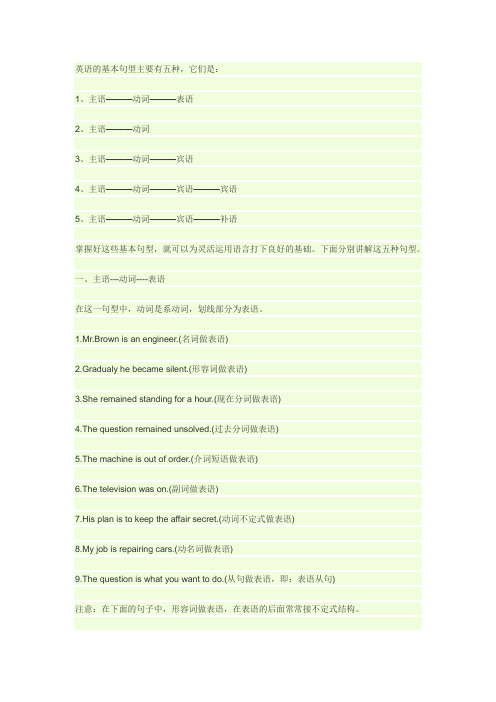
英语的基本句型主要有五种,它们是:1、主语———动词———表语2、主语———动词3、主语———动词———宾语4、主语———动词———宾语———宾语5、主语———动词———宾语———补语掌握好这些基本句型,就可以为灵活运用语言打下良好的基础。
下面分别讲解这五种句型。
一、主语---动词----表语在这一句型中,动词是系动词,划线部分为表语。
1.Mr.Brown is an engineer.(名词做表语)2.Gradualy he became silent.(形容词做表语)3.She remained standing for a hour.(现在分词做表语)4.The question remained unsolved.(过去分词做表语)5.The machine is out of order.(介词短语做表语)6.The television was on.(副词做表语)7.His plan is to keep the affair secret.(动词不定式做表语)8.My job is repairing cars.(动名词做表语)9.The question is what you want to do.(从句做表语,即:表语从句)注意:在下面的句子中,形容词做表语,在表语的后面常常接不定式结构。
I'm happy to meet you.They are willing to help.We are determined to follow his example.二、主语———动词在这一句型中,动词为不及物动词及不及物的动词词组。
在有的句子中,不及物动词可以有状语修饰。
1.The sun is rising.2.I'll try.3.Did you sleep well?(well做状语,修饰不及物动词sleep)4.The engine broke down.注意:在此句型中,有少数不及物动词表达被动含义,表达主语本身所具有的特性,不用被动语态。
句子成分分析与翻译教学设计
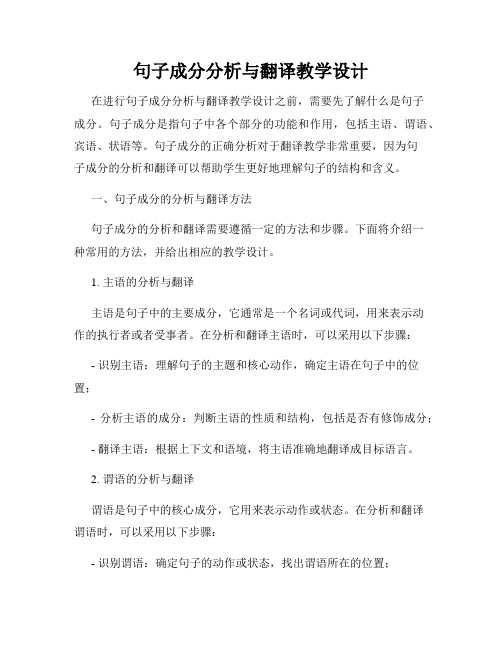
句子成分分析与翻译教学设计在进行句子成分分析与翻译教学设计之前,需要先了解什么是句子成分。
句子成分是指句子中各个部分的功能和作用,包括主语、谓语、宾语、状语等。
句子成分的正确分析对于翻译教学非常重要,因为句子成分的分析和翻译可以帮助学生更好地理解句子的结构和含义。
一、句子成分的分析与翻译方法句子成分的分析和翻译需要遵循一定的方法和步骤。
下面将介绍一种常用的方法,并给出相应的教学设计。
1. 主语的分析与翻译主语是句子中的主要成分,它通常是一个名词或代词,用来表示动作的执行者或者受事者。
在分析和翻译主语时,可以采用以下步骤:- 识别主语:理解句子的主题和核心动作,确定主语在句子中的位置;- 分析主语的成分:判断主语的性质和结构,包括是否有修饰成分;- 翻译主语:根据上下文和语境,将主语准确地翻译成目标语言。
2. 谓语的分析与翻译谓语是句子中的核心成分,它用来表示动作或状态。
在分析和翻译谓语时,可以采用以下步骤:- 识别谓语:确定句子的动作或状态,找出谓语所在的位置;- 分析谓语的成分:判断谓语的性质和结构,确定它是否需要搭配其他成分;- 翻译谓语:将谓语准确地翻译成目标语言,注意语态和时态的转换。
3. 宾语的分析与翻译宾语是句子中的重要成分,它接受或者承受动作的影响。
在分析和翻译宾语时,可以采用以下步骤:- 识别宾语:确定动作的承受者或影响的接受者;- 分析宾语的成分:判断宾语的性质和结构,确定它是否需要进一步分析;- 翻译宾语:根据上下文和语境,将宾语准确地翻译成目标语言。
4. 状语的分析与翻译状语是修饰句子成分的成分,它可以表示时间、地点、原因、方式等。
在分析和翻译状语时,可以采用以下步骤:- 识别状语:识别句子中表示时间、地点、原因、方式等信息的词语;- 分析状语的成分:判断状语的性质和结构,确定它对句子成分的修饰作用;- 翻译状语:根据上下文和语境,将状语准确地翻译成目标语言。
二、教学设计基于以上句子成分分析与翻译方法,设计如下教学活动:1. 教学目标- 理解句子成分分析与翻译的重要性;- 掌握句子成分分析的基本方法;- 能够准确进行句子成分的翻译。
句子成分分析

•
O
3. Sentences with verbs such as give, bring, buy and send can have a direct object (DO) and an indirect object (IO).
The braces have brought me so much trouble.
句末。
分析句子成分
小结1: a. 主语就在句首, 有时句首内容很长。 The teacher with his students ______(like/likes) fishing. b. 谓语就是动词。 He likes fishing. c. 状语的位置和排序(应该遵循的原则):
主要强调时间状语和地点状语。 错误:He 12 o’clock at home has lunch.
S
V
IO
DO
The indirect object is the person or thing that receives something.
The direct object is the thing that is received.
Exercise 3:找出下列句子中的直接宾语 DO
(direct object) 和 间接宾语IO (indirect object).
Exercise 5: 找出下列句子的状语Adverbial (A)
• 1. There was a big smile on her face.
• 2. Every night he heard the noise.
• 3. She loves library because she loves books.
初中英文句子成分划分

初中英文句子成分划分英语句子是英语学习的基础,通过句子,强化语音语调,通过句子,巩固词汇的运用,通过句子,巩固语法知识,通过句子,达到交际和运用的目的。
下面是店铺带来的初中英文句子成分划分,欢迎阅读!初中英文句子成分划分精选一、句子成分精讲句子成分:主语、谓语、宾语、表语、定语、状语、补语等。
主要成分:主语和谓语1、主语一个句子中需要加以说明或描述的对象。
主语的位置:The school is far from here. 名词做主语She goes to school by bike.Eight is a lucky number.The blind need more help. 代词做主语数词做主语名词化的形容词做主语There is a pen on the desk. 名词做主语Predicting the future is interesting.To be a doctor is my dream.2、谓语表示人或事物(主语)的动作和存在的状态.英语中由动词be、动词have和行为动词来充当谓语动词句子的时态和语态是通过谓语表现出来。
谓语动词往往由一个或一个以上的构成。
分析句子的主语和谓语Mr. Li teaches English.He can play the piano.My parents and I are having dinner.3、表语用来说明主语的身份、特征、性质、状态。
表语的位置用在动词be和系动词的后面。
名词、代词、数词、介词短语、副词等都可以和连系动词一起构成复合谓语。
Your pen is on the desk.He got very angry.My dream is to have a robot.常见的系动词动名词做主语不定式短语做主语1. be动词2. 与感觉有关的动词 look, sound, smell, taste, feel 等3. 表示状态变化的动词,意为“变得” “变成” 如get, grow, turn等上述两类词作连系动词时要用形容词作表语,千万不能用副词。
英语句子成分句子结构讲解及练习含答案

英语句子成分与英语句子构造讲解及练习1主语〔subject〕: 句子说明的人或事物。
The sun rises in the east. 〔名词〕He likes dancing. 〔代词〕Twenty years is a short time in history. (数词)Seeing is believing. 〔动名词〕To see is to believe. 〔不定式〕What he needs is a book. 〔主语从句〕It is very clear that the elephant isround and tall like a tree. 〔It形式主语,主语从句是真正主语〕谓语〔predicate〕: 说明主语的动作、状态与特征。
We study English.He is asleep.表语〔predicative〕: 系动词之后的成分,表示主语的性质、状态与特征。
He is a teacher. 〔名词〕Seventy-four! You don’t look it.〔代词〕Five and five is ten. 〔数词〕He is asleep. 〔形容词〕His father is in. 〔副词〕The picture is on the wall.( 介词短语)My watch is gone / missing / lost.〔形容词化的分词〕To wear a flower is to say “I’mpoor, I can’t buy a ring. 〔不定式〕The question is whether they willcome. 〔表语从句〕〔常见的系动词有: be, sound〔听起来〕, look〔看起来〕, feel(摸起来,smell〔闻起来〕, taste〔尝、吃起来〕, remain第1 页〔保持,仍是〕, feel〔感觉〕 ...It sounds a good idea.The sound sounds strange.Her voice sounds sweet.Tom looks thin.The food smells delicious.The food tastes good.The door remains open.Now I feel tired.宾语:1〕动作的承受者-----动宾I like China. 〔名词〕He hates you. 〔代词〕How many do you need We need two. 〔数词〕We should help the old and thepoor.I enjoy working with you. 〔动名词〕I hope to see you again. 〔不定式〕Did you write down what he said〔宾语从句〕2〕介词后的名词、代词与动名词-----介宾Are you afraid of the snakeUnder the snow, there are manyrocks.3〕双宾语-----间宾〔指人〕与直宾〔指物〕He gave me a book yesterday.Give the poor man some money.宾补:对宾语的补充,全称为宾语补足语。
科技英语翻译第9章详解

Chapter Nine Translation from Sentence to Discourse
第1节 句子成分的译法 4. 宾语的译法 Instructions and microinstructions do not
have the same format. 指令和微指令的格式不同。〔译为主语〕 Each organism owes its existence to genes it
an energy source. 应当强调指出,激光器并不是一个能源。〔译为无主句〕
Chapter Nine Translation from Sentence to Discourse
第1节 句子成分的译法 2. 谓语的译法 Using a person’s voice as an identifier is based on
Chapter Nine Translation from Sentence to Discourse
第2节 否认句的译法 5.几乎否认句的译法 在英语中,几乎否认虽然没有完全否认,但肯定的含义很
少,通常这些句子中都含有barely,hardly, rarely, scarcely, few, little, seldom, almost no等表示几乎否认 的词。汉译时,可以为“极少〞、“几乎没〔不〕〞、 “很少〞等。 Little information is given as to the origin of life. 关于生命起源方面的资料极少。 Curiously, Uranus has almost no such excess heat. 奇怪的是天王星几乎没有这种多余的热量 。
Chapter Nine Translation from Sentence to Discourse
英语句子成分分析(多版本)
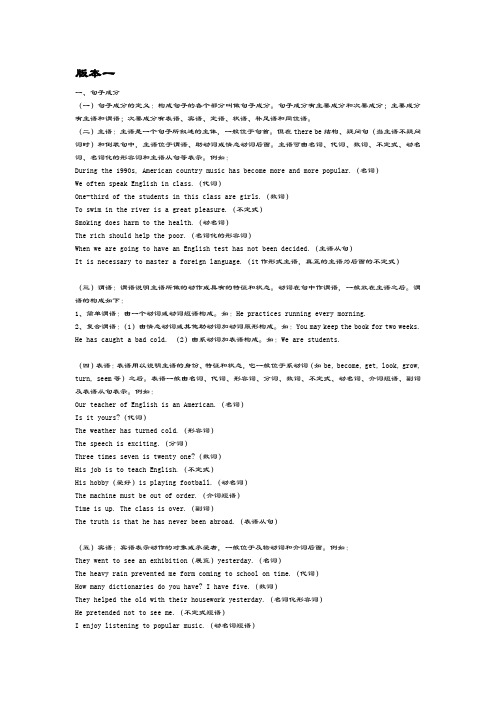
版本一一、句子成分(一)句子成分的定义:构成句子的各个部分叫做句子成分。
句子成分有主要成分和次要成分;主要成分有主语和谓语;次要成分有表语、宾语、定语、状语、补足语和同位语。
(二)主语:主语是一个句子所叙述的主体,一般位于句首。
但在there be结构、疑问句(当主语不疑问词时)和倒装句中,主语位于谓语、助动词或情态动词后面。
主语可由名词、代词、数词、不定式、动名词、名词化的形容词和主语从句等表示。
例如:During the 1990s, American country music has become more and more popular.(名词)We often speak English in class.(代词)One-third of the students in this class are girls.(数词)To swim in the river is a great pleasure.(不定式)Smoking does harm to the health.(动名词)The rich should help the poor.(名词化的形容词)When we are going to have an English test has not been decided.(主语从句)It is necessary to master a foreign language.(it作形式主语,真正的主语为后面的不定式)(三)谓语:谓语说明主语所做的动作或具有的特征和状态。
动词在句中作谓语,一般放在主语之后。
谓语的构成如下:1、简单谓语:由一个动词或动词短语构成。
如:He practices running every morning.2、复合谓语:(1)由情态动词或其他助动词加动词原形构成。
如:You may keep the book for two weeks. He has caught a bad cold. (2)由系动词加表语构成。
Unit1Lesson1Lifestyles课文讲解及句子成分分析讲义高中英语北师大版
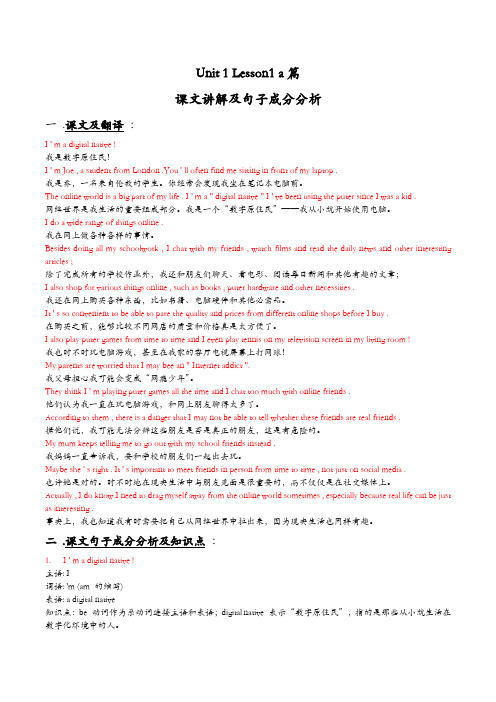
Unit 1 Lesson1 a篇课文讲解及句子成分分析一.课文及翻译:I ' m a digital native !我是数字原住民!I ' m Joe , a student from London .You ' ll often find me sitting in front of my laptop .我是乔,一名来自伦敦的学生。
你经常会发现我坐在笔记本电脑前。
The online world is a big part of my life . I ' m a " digital native " I ' ve been using the puter since I was a kid .网络世界是我生活的重要组成部分。
我是一个“数字原住民”——我从小就开始使用电脑。
I do a wide range of things online .我在网上做各种各样的事情。
Besides doing all my schoolwork , I chat with my friends , watch films and read the daily news and other interesting articles ;除了完成所有的学校作业外,我还和朋友们聊天、看电影、阅读每日新闻和其他有趣的文章;I also shop for various things online , such as books , puter hardware and other necessities .我还在网上购买各种东西,比如书籍、电脑硬件和其他必需品。
It ' s so convenient to be able to pare the quality and prices from different online shops before I buy .在购买之前,能够比较不同网店的质量和价格真是太方便了。
英语句子成分分析
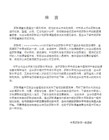
The ugly man who has a lot of money chooses living alone.(定语)
Although the ugly man has a lot of money, he chooses living alone.(状语)
在阅读这样的复杂句的时候,首先要找出主句或从句从哪儿开始,到哪儿结束,首先理解主句的意思,最后再把从句的内容与主句综合起来。
看到这里,可能有些同学又会产生抵触情绪了,其实这些细致的划分我们可以跳过,对于具体句子中的从句如何解决其实很简单,你只需知道从句做什么成分就可以了,从句做什么成分,就是个什么功能的从句。
The saith a lot of money chooses living alone. (表语)
首先找到句子主干成分:"One of the results was..."很明显的主系表结构,that 引导的显然是个表语从句,表语从句中又有一个由What引导的主语从句,主干结构是"...was firmly established." 最后再加上修饰成分,句子就很容易分析了,也可以轻而易举的翻译并理解了:两个派别斗争的结果之一是:直到1890年,这个曾经被称作"美国的"、"本土的"、或者偶尔被称作是"纽约的"美国艺术题材中最有代表性的学派,以哈德逊河学派命名被稳固的建立在批评家和公众的思想之中了。
What the ugly man chooses is living alone.(主语)
We all know that the ugly man chooses living alone.(宾语)
The thing that the ugly man with a lot of money chooses living alone was known to everyone. (同位语)
英语句子成分和句子类型讲义
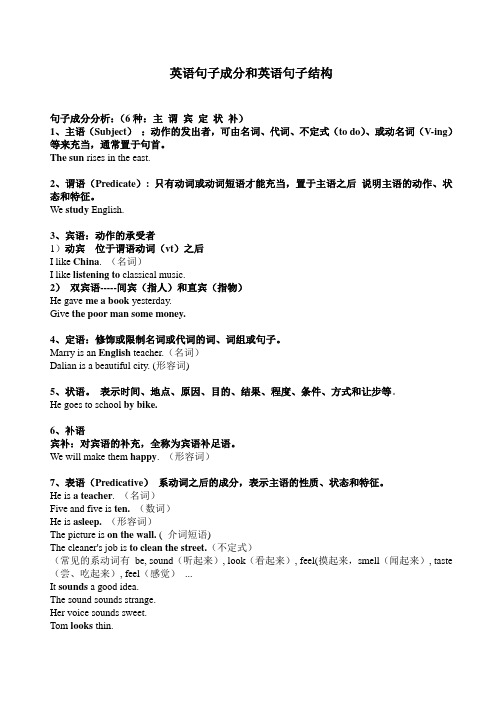
英语句子成分和英语句子结构句子成分分析:(6种:主谓宾定状补)1、主语(Subject):动作的发出者,可由名词、代词、不定式(to do)、或动名词(V-ing)等来充当,通常置于句首。
The sun rises in the east.2、谓语(Predicate): 只有动词或动词短语才能充当,置于主语之后说明主语的动作、状态和特征。
We study English.3、宾语:动作的承受者1)动宾位于谓语动词(vt)之后I like China. (名词)I like listening to classical music.2)双宾语-----间宾(指人)和直宾(指物)He gave me a book yesterday.Give the poor man some money.4、定语:修饰或限制名词或代词的词、词组或句子。
Marry is an English teacher.(名词)Dalian is a beautiful city. (形容词)5、状语。
表示时间、地点、原因、目的、结果、程度、条件、方式和让步等。
He goes to school by bike.6、补语宾补:对宾语的补充,全称为宾语补足语。
We will make them happy. (形容词)7、表语(Predicative)系动词之后的成分,表示主语的性质、状态和特征。
He is a teacher. (名词)Five and five is ten. (数词)He is asleep.(形容词)The picture is on the wall. ( 介词短语)The cleaner's job is to clean the street.(不定式)(常见的系动词有be, sound(听起来), look(看起来), feel(摸起来,smell(闻起来), taste (尝、吃起来), feel(感觉)...It sounds a good idea.The sound sounds strange.Her voice sounds sweet.Tom looks thin.The food smells delicious.The food tastes good.句子结构简单句的五个基本句型主+谓(vi不及物动词) She came./ My head aches.主+谓(vt及物动词)+宾语She likes English.主+谓+间接宾语+直接宾语She gave John a book.She bought a book for me.主+系+表She is happy.主+谓(vt.)+宾+宾补She makes her mother angry.(There +be There lies a book on the desk. )句子的种类:陈述句/ 祈使句/ 感叹句/ 疑问句练习:分析下列句子成分1. Our school is far from my home.2. It is a great pleasure to talk with you3. All of us considered him honest.4. My grandfather bought me a pair of sports shoes.5.He broke a piece of glass.6. Trees turn green when spring comes.7. They pushed the door open. 8. Grandma told me an interesting story last night. 9.He wrote some letters to his friends. 10. We need a place twice larger than this one.11. He asked us to sing an English song. 12. We will make our school more beautiful.13. She showed us many of her pictures.14. The cars made in Japan are better than those in Germany.15. At last he got home, tired and hungry. 16. Would you please pass me the cup?17 Mary handed her homework to the teacher. 18. Do you know the latest news about him?19. I’ll get my hair cut tomorrow.翻译练习:主谓结构(主语+不及物动词)你应当努力学习。
英语句子成分分析

二: S V P (主+系+表)
• She is an English teacher.
她是一名英语老师。
• That sounds good.
听起来不错!
三: S V O (主+谓+宾)
• He goes to school everyday. • I want a bike.
四: S V o O (主+谓+间宾+直宾)
英语五种基本句型
• 一: S V (主+谓)
• 二: S V P (主+系+表) • 三: S V O (主+谓+宾)
• 四: S V o O (主+谓+间宾+直宾) • 五: S V O C (主+谓+宾+宾补)
一: S V (主+谓)
• The moon rose.
月亮升起来了
• It is raining.
选出下列句中的谓语 ① He looked up the word in the dictionary. A. looked B. looked up C. looked up the word D. in the dictionary ② He caught a bad cold. A. he B. caught C.he caught D. a bad cold ③ He practices running every morning. A. running B. practices running C. practices D. every morning
地点状语
• 3. He went to see a film. • 4.We learn English by listening to tapes.
目的状语
方式状语
(七)宾语补足语(Object Complement)
句子成分分析与定义及简单句的翻译
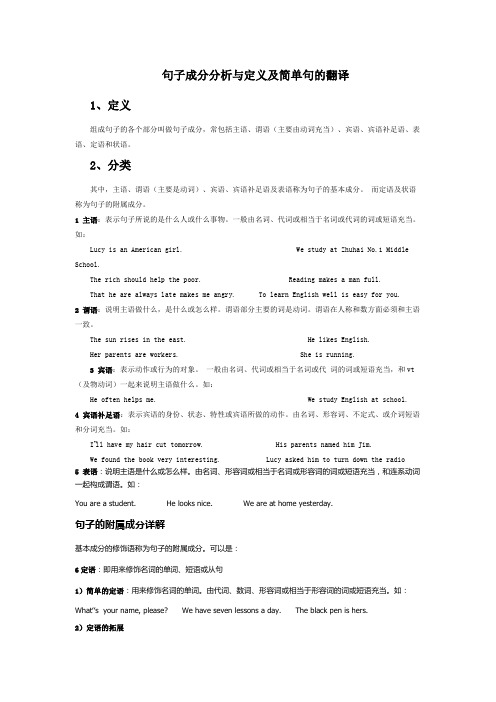
句子成分分析与定义及简单句的翻译1、定义组成句子的各个部分叫做句子成分,常包括主语、谓语(主要由动词充当)、宾语、宾语补足语、表语、定语和状语。
2、分类其中,主语、谓语(主要是动词)、宾语、宾语补足语及表语称为句子的基本成分。
而定语及状语称为句子的附属成分。
1 主语:表示句子所说的是什么人或什么事物。
一般由名词、代词或相当于名词或代词的词或短语充当。
如:Lucy is an American girl. We study at Zhuhai No.1 Middle School.The rich should help the poor. Reading makes a man full.That he are always late makes me angry. To learn English well is easy for you.2 谓语:说明主语做什么,是什么或怎么样。
谓语部分主要的词是动词。
谓语在人称和数方面必须和主语一致。
The sun rises in the east. He likes English.Her parents are workers. She is running.3 宾语:表示动作或行为的对象。
一般由名词、代词或相当于名词或代词的词或短语充当,和vt (及物动词)一起来说明主语做什么。
如:He often helps me. We study English at school.4 宾语补足语:表示宾语的身份、状态、特性或宾语所做的动作。
由名词、形容词、不定式、或介词短语和分词充当。
如:I‟ll have my hair cut tomorrow. His parents named him Jim.We found the book very interesting. Lucy asked him to turn down the radio5 表语:说明主语是什么或怎么样。
新句子成分分析及翻译
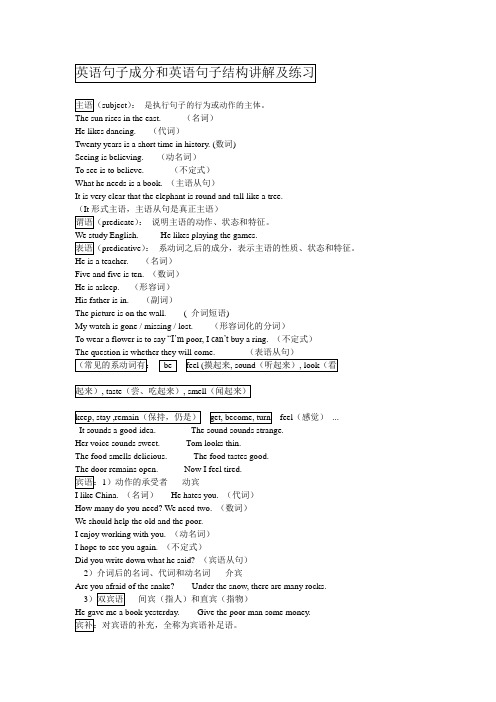
subject):是执行句子的行为或动作的主体。
The sun rises in the east. (名词)He likes dancing. (代词)Twenty years is a short time in history. (数词)Seeing is believing. (动名词)To see is to believe. (不定式)What he needs is a book. (主语从句)It is very clear that the elephant is round and tall like a tree.(It形式主语,主语从句是真正主语)predicate):说明主语的动作、状态和特征。
He likes playing the games.predicative):系动词之后的成分,表示主语的性质、状态和特征。
He is a teacher. (名词)Five and five is ten. (数词)He is asleep. (形容词)His father is in. (副词)The picture is on the wall. ( 介词短语)My watch is gone / missing / lost. (形容词化的分词)To wear a flower is to say “I’m poor, I can’t buy a ring. (不定式)feel(感觉)...It sounds a good idea. The sound sounds strange.Her voice sounds sweet. Tom looks thin.The food smells delicious. The food tastes good.1)动作的承受者-----动宾I like China. (名词)He hates you. (代词)How many do you need? We need two. (数词)We should help the old and the poor.I enjoy working with you. (动名词)I hope to see you again. (不定式)Did you write down what he said? (宾语从句)2)介词后的名词、代词和动名词-----介宾3间宾(指人)和直宾(指物)Give the poor man some money.We elected him monitor. (名词)We all think it a pity that she didn’t come here. (名)We will make them happy. (形容词)We found nobody in. ( 副词)Please make yourself at home. 介词短语)Don’t let him do that. (省to不定式)His father advised him to teach the lazy boy a lesson. (带to不定式)Don’t keep the lights burning. (现在分词)(过去分词)He was elected monitor.She was found singing in the next room.Ai Yanling is a chemistry teacher.(名词)He is our friend. (代词)We belong to the third world. (数词)He was advised to teach the lazy boy a lesson.(形容词)The man over there is my old friend.(副词) The woman with a baby in her arms is my sister. (介词)The boys playing football are in Class 2. (现在分词)The trees planted last year are growing well now. (过去分词)I have an idea to do it well. (不定式)(定语从句)v., adj., adv., or 句子。
英语语法翻译教学法分析_句子成分
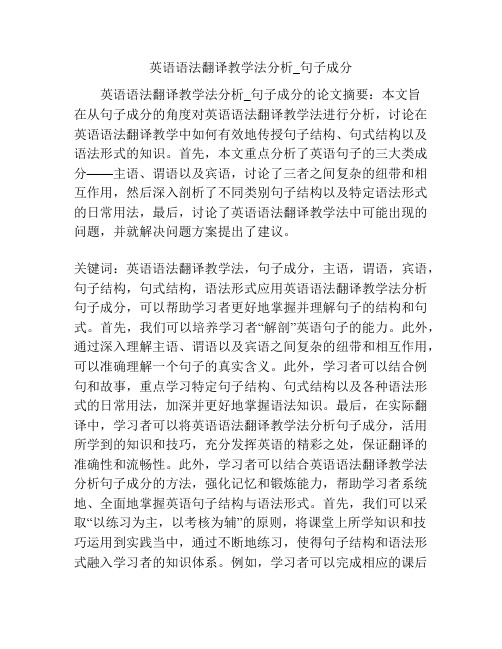
英语语法翻译教学法分析_句子成分英语语法翻译教学法分析_句子成分的论文摘要:本文旨在从句子成分的角度对英语语法翻译教学法进行分析,讨论在英语语法翻译教学中如何有效地传授句子结构、句式结构以及语法形式的知识。
首先,本文重点分析了英语句子的三大类成分——主语、谓语以及宾语,讨论了三者之间复杂的纽带和相互作用,然后深入剖析了不同类别句子结构以及特定语法形式的日常用法,最后,讨论了英语语法翻译教学法中可能出现的问题,并就解决问题方案提出了建议。
关键词:英语语法翻译教学法,句子成分,主语,谓语,宾语,句子结构,句式结构,语法形式应用英语语法翻译教学法分析句子成分,可以帮助学习者更好地掌握并理解句子的结构和句式。
首先,我们可以培养学习者“解剖”英语句子的能力。
此外,通过深入理解主语、谓语以及宾语之间复杂的纽带和相互作用,可以准确理解一个句子的真实含义。
此外,学习者可以结合例句和故事,重点学习特定句子结构、句式结构以及各种语法形式的日常用法,加深并更好地掌握语法知识。
最后,在实际翻译中,学习者可以将英语语法翻译教学法分析句子成分,活用所学到的知识和技巧,充分发挥英语的精彩之处,保证翻译的准确性和流畅性。
此外,学习者可以结合英语语法翻译教学法分析句子成分的方法,强化记忆和锻炼能力,帮助学习者系统地、全面地掌握英语句子结构与语法形式。
首先,我们可以采取“以练习为主,以考核为辅”的原则,将课堂上所学知识和技巧运用到实践当中,通过不断地练习,使得句子结构和语法形式融入学习者的知识体系。
例如,学习者可以完成相应的课后作业,可以完成一些由老师出的语法练习题,也可以尝试着翻译对话、文章等英文文本,不断地训练自己的语言技能,努力提高自己的语言水平,并实现英语语法翻译教学法分析句子成分。
另外,在考核中,老师也可以采用英语语法翻译教学法分析句子成分的方法,对学生作细致的考察。
例如,老师可以通过问答的形式,考察学生对句子的结构与语法形式的掌握情况;还可以通过让学生完成翻译练习,检测学生是否能够灵活运用所学知识,把语义更好地表达出来,提高翻译的准确性与流畅性。
- 1、下载文档前请自行甄别文档内容的完整性,平台不提供额外的编辑、内容补充、找答案等附加服务。
- 2、"仅部分预览"的文档,不可在线预览部分如存在完整性等问题,可反馈申请退款(可完整预览的文档不适用该条件!)。
- 3、如文档侵犯您的权益,请联系客服反馈,我们会尽快为您处理(人工客服工作时间:9:00-18:30)。
• win over 说服,胜诉;争取到…
to win sb over 笼络或赢得某人
P221-三(10)句子成分分析
时间状语
• When he catches a glimpse of a potencial antagonist,
主语
谓语
伴随状语
宾语
his instinct is to win (potencial antagonist)over [with charm and humor].
P221-三(10)斜体词译成形容词
• Together with earthquakes,volcanoes are phenomena
which both delight and terify human mind at the same time. • 和地震一样,火山爆发是一种会让人同时觉得兴奋
又害怕的现象。
P221-三(10)生词翻译
Together with earthquakes,volcanoes are phenomena which both delight and terrify human mind at the same time.
•volcanoes •delight n. 火山爆发,火山;火山群(volcano复数)
ห้องสมุดไป่ตู้
P221-三(10)生词翻译
When he catches a glimpse of a potencial antagonist,his instinct is to win over with charm and humor.
• antagonist n. 敌手;[解剖] 对抗肌;[生化] 拮抗物;反协 同试剂 • a glimpse of 瞥见
• 只要一看到潜在的对手,他就本能地要用他的魅力和风
趣把他笼络过来。
adj.高兴地;欣喜的 v. 使...兴高采烈;感到快乐
•terify vt.恐吓;使恐怖;使害怕
P221-三(10)句子成分分析
省略了主语 主谓宾
• (Volcanoes is)Together with earthquakes,volcanoes are phenomena (which both delight and terify human mind at the same time).
时间状语 宾语从句
• 和地震一样,火山爆发是一种会让人同时觉得兴 奋又害怕的现象。
P221-四(8)斜体词译成副词
• When he catches a glimpse of a potencial
antagonist,his instinct is to win over with
charm and humor. • 只要一看到潜在的对手,他就本能地要用他的 魅力和风趣把他笼络过来。
